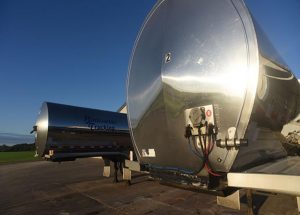
The Big Two controlled some two-thirds of all raw milk processed nationwide, essentially forcing farmers to sell on the processors’ terms.
Last year, then-President Trump’s Justice Department (“justice”) allowed the $14 billion DFA empire to devour the $8 billion Dean conglomerate, leaving individual farm families at the mercy of one domineering colossus. DFA now controls 70 percent of our nation’s entire raw milk supply.
This is just one example of the sweeping lockdown of the “free market” resulting from about five decades of intentional actions and inactions by both Republican and Democratic regimes that have recklessly dismissed the founders’ fear of what Thomas Jefferson decried as the “aristocracy of our monied corporations.” Piece by piece, politicians, lobbyists and lawyers have steadily dismantled our nation’s commitment to trust busting.
Antitrust is a profound component of America’s democratic vision, linking us from the Boston Tea Party to the Bill of Rights, the rise of the populist movement, the Pullman Strike of 1894, the writings of Ida Tarbell and W.E.B. Du Bois, Louis Brandeis’ concept of The New Freedom, Franklin Roosevelt’s New Deal, Harry Truman’s Fair Deal, Martin Luther King Jr.’s Poor People’s Campaign, Occupy Wall Street, Sen. Bernie Sanders, Sen. Elizabeth Warren, Rev. William Barber’s Moral Mondays — and now you and me.
The political and media establishment bought into the corporate dogma that monopolies produce economic “efficiencies,” so why not turn ’em loose? Thus, trusts are us! Monopolistic corporations today have chokeholds on nearly every market, setting prices, wages and terms of business. Worse, their power is systemic, dominating elections, health access, education opportunities, communications … our society!
That’s why I don’t favor the term “antitrust.” It’s too soft — I mean, who’s against trust? Anti-theft is more blunt, easily understood and true. The reason our people have fought corporate dominance so hard for centuries is because a monopoly is nothing but organized theft; it steals America’s fundamental principles of fairness and opportunity for all. By controlling the marketplace, workplace and public space, the few take away everyone else’s freedom of choice and their possibilities of maximizing their intellect, skills, labor and other abilities to achieve their dreams. That’s the theft of the very idea of America.
Indeed, monopoly power quickly goes to the head of monopolists, turning executive-suite tycoons into little tyrants who feel entitled to impose institutionalized inequality over America’s democratic ideals. To rationalize their plutocratic behavior, the privileged ones try to foster a culture that accepts one’s net worth as the measure of one’s worthiness. Remember just a couple of years back when an exclusive club of America’s uber-rich CEOs and Wall Street speculators went on a PR blitz glorifying themselves as “The Makers”? “We are essential wealth creators,” they thundered!
But — oops! — nothing like a pandemic to deflate even the most bloated of egos. Hello to all you nurses, farm workers, grocery clerks, truck drivers, utility crews, and other low-paid “nobodies” who turn out to be the actual essential ones holding the system together. While those haughty “makers” fled to isolated vacation spots to escape the coronavirus, millions of frontline workers faced deadly virus exposure to keep America functioning.
A genuinely grateful public has literally applauded those on the job, hailing them as national and personal heroes. The appreciation was so widespread that several major corporations joined last spring in a show of solidarity, running national ad campaigns touting “hero” pay hikes for those enduring such a grave hazard. But while the employees and the virus endured, the corporate generosity vanished as soon as its PR value faded.
Supermarket giant Kroger, for example, had ballyhooed a pay increase of $2 an hour last April for its heroes, loudly declaring, “We will continue to support you, and your families during this difficult time.” Just six weeks later, even as the pandemic spread, pffffft: The $2 “hero pay” was unceremoniously terminated. Mingier yet, early this year, when city officials in Seattle and Long Beach, California, mandated pandemic pay for frontline grocery workers, bosses at Kroger’s national headquarters abruptly shut down stores in those areas.
Kroger reaped $2.8 billion in profits in 2020! Where did that bonanza go? The top executives spent a billion dollars on a stock buyback program — a corporate manipulation scheme that artificially jacks up stock prices, thus enriching the big investors and executives who own most of the stock. How rich are they? One example: Last year, Kroger CEO Rodney McMullen was reportedly paid $21,129,648.
One man, one year. And unlike the typical Kroger worker, who draws an estimated $27,000 a year, McMullen is not on the front line putting his life at risk. That’s why working families spell “boss” backward: double SOB.
To find out more about Jim Hightower and read features by other Creators Syndicate writers and cartoonists, visit the Creators webpage at http://www.creators.com.

























